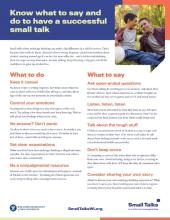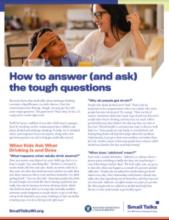Small Talks: Start Talking
Wisconsin Substance Use Summit: August 5-6, 2026
Interested in building healthy communities through substance use prevention, treatment, and recovery services and supports? Join us in Green Bay or virtually for this first-of-its-kind learning and networking event. Visit the Wisconsin Substance Use Summit page to learn more.
Think kids won’t listen? Think again. Research shows that parents and other caring adults are the most powerful influence on choices kids make about underage drinking. That means you can make a real difference, especially if you start early. Don’t worry; it’s easier than you may think. We can show you how, with helpful suggestions for tackling tough questions and ideas for getting the conversations started.
What is a small talk?
Small talks are short, casual conversations that help adults connect with kids on the important stuff, like underage drinking. Having lots of small talks over time helps build trust and set expectations as kids change and grow. Luckily, there’s no big production necessary. Just choose the moment that feels right to you. You can have a small talk anytime, anywhere.
What to say along the way
Start a small talk with one or two simple questions.
Children (Ages 5-7)
They’re curious about their bodies. Focus on the way alcohol affects a person’s motor skills, judgment, and behavior. Try asking:
- “When do you think someone is ready to try alcohol?”
- “Why do you think it's illegal for kids under the age of 21 to drink alcohol?”
Tweens (Ages 8-12)
Tweens are into their friends and unusual facts. Explain how underage drinking can put kids their age in danger, and practice how to deal with peer pressure. Spark conversation by asking:
- “Have you ever seen an adult drink too much? What did you think or feel?”
- “What could you say if you were offered a drink and you didn't want to look foolish?”
Teens (Ages 13-17)
They’re growing independent, so help them find good reasons to wait. Talk about the risks, their future, and making safe choices. Get them talking with:
- “Do you see other kids drinking at parties you go to? How does it make you feel?
- “Are you at all worried about becoming addicted to alcohol or drugs?”
Answering difficult questions
Small talks are easy to start. But once the conversation gets going, you may face some tough questions. The good news? That’s a great sign. Questions mean the kid is engaged and your talk is on the right track. Want to build your confidence? Take a look at the thorny questions and straightforward answers (suggested by real experts) below.
People who drink alcohol aren’t “bad.” That’s why it’s important be be compassionate when you explain why some people become intoxicated. Try saying:
“There are lots of reasons. Sometimes adults don’t mean to get drunk, but they aren’t careful when they’re drinking, and they have too much. Others get drunk because they think it’s the only way they can relax or have fun.”
The link between alcohol use and mental health is an important topic to discuss with kids, too. You could say:
“Some people are sad, lonely, or overwhelmed, and think getting drunk will help them forget about their problems. Unfortunately, it just gives them more problems and makes them feel sick. Another reason is that some people have a disease called alcohol use disorder that they need help treating.”
After explaining that drinking can be dangerous, it makes sense a kid would question why anyone would want to drink. It’s important to make the distinction that it is always harmful when kids drink, but it is not always harmful for adults when they drink in moderation. You can explain the idea of moderation this way:
“One glass of wine or one beer with dinner can be a nice treat for a grownup, just like one piece of cake is for you. But I’m careful not to drink too much.”
You may also share the reasons why you drink–such as to enhance a meal or celebrate a special occasion–and talk about how you make sure to never drink, then drive.
Don’t let your past stop you from talking about underage drinking.
If you drank as a teenager, be honest. Acknowledge that it was risky. Make sure to emphasize that we now know even more about the risks to kids who drink underage. Consider telling kids relatable stories about making smart decisions when it comes to alcohol. These could be stories that show the consequences of engaging in risky behavior.
If you didn’t use alcohol when you were growing up, talk about the reasons why you chose to grow up alcohol free. You could also tell them how you learned to handle outings where underage drinking took place.
This question is a great opportunity to let kids know you’re there to guide and support them. Try saying:
“I love you and it’s my job to help you stay healthy. Friends and other kids will try alcohol, so it’s natural for you to be curious about it. I’m here to answer any questions you have, and even brainstorm what you can say to your friends.”
Let kids know their choices—and well-being—matter to you by telling them:
“It’s important to me that you don’t drink. It’s bad for you in so many ways. I want to make sure you’re safe, so never hesitate to call me if you or one of your friends is in trouble. No questions asked. I will be there if you need me.”
Kids are always looking for adventure, so avoid saying things like, “You couldn’t handle it.” It could be interpreted as a challenge. Instead, start by sharing one of the several reasons why people under the age of 21 should not drink. It could inspire a longer conversation or future small talks. Consider saying:
- “Drinking before you’re 21 is against the law.”
- “Because your brain is still developing, drinking can change the way your brain works now and into the future.”
- “Your body is also still growing, so alcohol would have a much greater effect on your health.”
- “Young people who drink are more likely to become depressed or have anxiety.”
- “Kids who try alcohol before they turn 15 are four times more likely to develop alcoholism.”
- “Alcohol affects your ability to make good choices.”
How to help kids when they're on their own
You can't control a kid when their out of your sight. But you can help them become a person who has good values and good judgment. You can’t always prevent a kid from being offered alcohol, but you can help them be prepared if it occurs. Giving kids the tools to handle peer pressure is one of the most important things you can do to help them make healthy choices and stay alcohol-free.
Saying no is never easy, at any age. As a caregiver, it’s important to set clear boundaries so kids understand expectations for their behavior and can make positive choices. For young people, finding ways to navigate social situations and stay alcohol-free takes practice and support. The tips below can help you both.
Tips for setting boundaries
Taking these steps can help:
- Communicate your positions on alcohol and underage drinking. Don’t assume kids know what you expect of them.
- Set realistic rules about underage drinking, parties, and what kids should do around alcohol. Consider including your child in setting family rules with clear consequences.
- Be consistent. Don’t let a kid off the hook for their first offense or end a consequence (like losing social, device, or car privileges) early.
- Ask questions before young people go out, like “Will an adult be there?” or “Do you think kids will be drinking?”
- Reward good behavior. Encourage kids to reach out when they need help and show your appreciation when they do.
Tips for helping kids say no
These tools and tips work:
- Pick a code word a kid can text to you if they need a ride home or an excuse to leave a sticky situation.
- Before kids go out, practice a few “No, thanks!” responses to use in case they’re offered alcohol, like:
- “No, thanks! I’m the designated driver.”
- “Thanks, but I want to keep a clear head tonight.”
- “That’s okay, I don’t drink.”
- “No, thanks. I have a game tomorrow.”
- “Nothing for me. I don’t want to get kicked off the team.”
- “I can’t. I’m allergic to alcohol.”
- “No, thanks! I have to get up early tomorrow.”
- “Thanks, but I don’t feel well.”
- "I'm on meds that make it dangerous to drink."
Taking risks is a normal part of growing up. When kids take healthy risks, they build confidence and learn more about themselves. But without these challenges, young people may find the excitement they’re looking for in dangerous activities like underage drinking. Help a teen find healthy ways to put themselves out there, like:
- Joining a sports team or club.
- Running for a student office at school.
- Learning to cook.
- Taking dancing lessons.
- Performing live music.
- Becoming a social activist.
- Rock climbing, snowboarding, or mountain bike.
- Trying out for school plays or community theater.
- Volunteering in their community.
- Creating a public art project.
Helpful resources
Have a stress-free small talk. Our downloadable handouts offer practical, proven advice to help you feel more prepared.
Talk tips
Have a successful small talk.
Download the tip sheet (PDF)
Question guide
Get ready for tough questions.
Download the guide (PDF)
Get tips from real Wisconsin talkers
Learn how caring adults worked through their stage fright, got prepared, and started having successful small talks about alcohol with the kids in their lives.
Hear from caregivers and others who have talked with kids about alcohol


